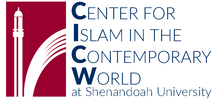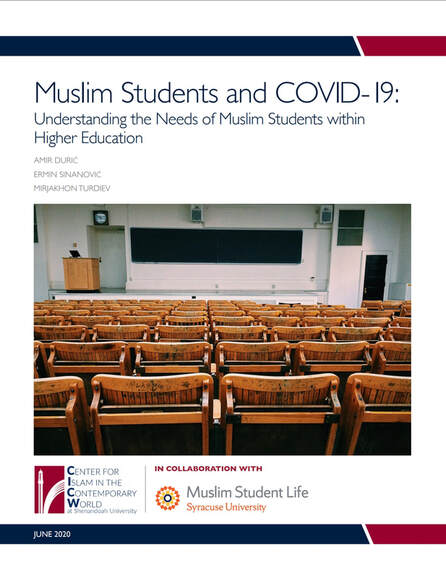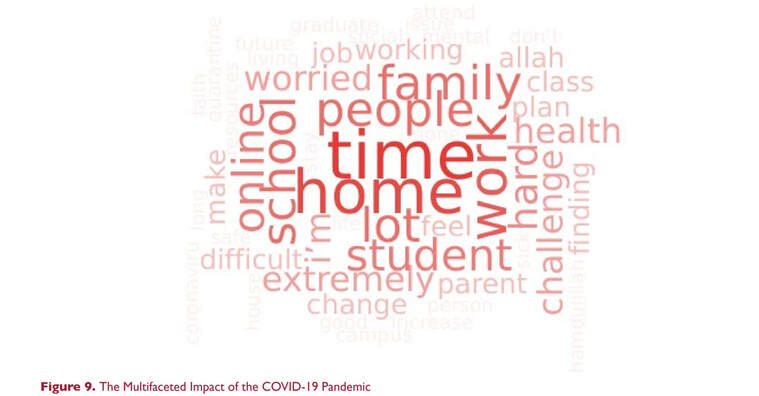Muslim Students and Covid-19 Pandemic
A Survey
ABOUT THE SURVEY
This survey is a collaboration between the Center for Islam in the Contemporary World at Shenandoah University (CICW) and the Muslim Student Life at Syracuse University (MSL). The goal of the survey was to understand the impact of COVID-19 pandemic on the Muslim students in higher education in the United States. The survey leveraged and adjusted some of the questions from previous and ongoing data collection efforts conducted by Institute for Social Policy and Understanding, Student Veterans of America, and the Bob Woodruff Foundation. The survey was conducted from March 30 through April 10, 2020, and was completed by 498 survey takers from 32 U.S. states. The team of researchers contacted more than 100 Muslim Student Associations in 42 states to request support in the dissemination effort. The survey was also shared through the Association of Muslim Chaplains (AMC), Hartford Seminary, National Association of Campus and University Chaplains (NACUC) and Association for College and University Religious Affairs (ACURA). This survey report reflects key findings that emerged in the survey, followed by concrete recommendations for practitioners who serve Muslim students.
Note of thanks: The authors would like to thank Dr. Mirza Tihić of Syracuse University who helped in designing, administering, and interpreting survey data.
This survey is a collaboration between the Center for Islam in the Contemporary World at Shenandoah University (CICW) and the Muslim Student Life at Syracuse University (MSL). The goal of the survey was to understand the impact of COVID-19 pandemic on the Muslim students in higher education in the United States. The survey leveraged and adjusted some of the questions from previous and ongoing data collection efforts conducted by Institute for Social Policy and Understanding, Student Veterans of America, and the Bob Woodruff Foundation. The survey was conducted from March 30 through April 10, 2020, and was completed by 498 survey takers from 32 U.S. states. The team of researchers contacted more than 100 Muslim Student Associations in 42 states to request support in the dissemination effort. The survey was also shared through the Association of Muslim Chaplains (AMC), Hartford Seminary, National Association of Campus and University Chaplains (NACUC) and Association for College and University Religious Affairs (ACURA). This survey report reflects key findings that emerged in the survey, followed by concrete recommendations for practitioners who serve Muslim students.
Note of thanks: The authors would like to thank Dr. Mirza Tihić of Syracuse University who helped in designing, administering, and interpreting survey data.
SUMMARY
Overall, the majority of Muslim students have no confidence in the federal government and the President of United States to effectively respond to Muslim students’ needs in response to the outbreak of the coronavirus/COVID-19 pandemic. In contrast, Muslims students have a much higher confidence in state government and their school, while the majority have confidence in their local mosques, national Islamic institutions, Muslim chaplaincy at the school and the Muslim Student Association. Further, the results show an overall increase in religious practices, and higher level of stress, anxiety and depression. Daily prayers, fasting, dhikr and optional prayers are sometimes approached formally without deep understanding or engagement with its higher and holistic objectives. This approach puts limitations on the effects and benefits these practices might effect on overall well-being. The above findings are consistent with prior research (Durić, 2019) and indicate the daily prayers, fasting, dhikr, and optional prayers are more practiced in challenging times. For instance, an anxiety level of the respondents that pray obligatorily (Fard) prayers regularly increased by 60.41% (20.83% - significantly increased, 39.58% somewhat increased). In contrast, there is an 81.81% increase in anxiety level of the respondents who never prayed obligatory (Fard) prayers. These findings suggest more in-depth qualitative research to better understand the relationships between rituals, coping with trials, and well-being. Considering COVID’s impact on the well-being of the students, only 16 percent of students have health insurance through their institution of higher education, while 7 percent have no health insurance at all. These students could be at risk if the school closes, they graduate or if they can’t afford tuition. Finally, the post-graduation phase or the employment seeking of the students has been impacted as almost half of the respondents (47 percent) feel their ability to apply for jobs or internships has been negatively affected by the change in instruction, while about 68 percent of them are worried about the impact of COVID-19 on their academic goals.
Overall, the majority of Muslim students have no confidence in the federal government and the President of United States to effectively respond to Muslim students’ needs in response to the outbreak of the coronavirus/COVID-19 pandemic. In contrast, Muslims students have a much higher confidence in state government and their school, while the majority have confidence in their local mosques, national Islamic institutions, Muslim chaplaincy at the school and the Muslim Student Association. Further, the results show an overall increase in religious practices, and higher level of stress, anxiety and depression. Daily prayers, fasting, dhikr and optional prayers are sometimes approached formally without deep understanding or engagement with its higher and holistic objectives. This approach puts limitations on the effects and benefits these practices might effect on overall well-being. The above findings are consistent with prior research (Durić, 2019) and indicate the daily prayers, fasting, dhikr, and optional prayers are more practiced in challenging times. For instance, an anxiety level of the respondents that pray obligatorily (Fard) prayers regularly increased by 60.41% (20.83% - significantly increased, 39.58% somewhat increased). In contrast, there is an 81.81% increase in anxiety level of the respondents who never prayed obligatory (Fard) prayers. These findings suggest more in-depth qualitative research to better understand the relationships between rituals, coping with trials, and well-being. Considering COVID’s impact on the well-being of the students, only 16 percent of students have health insurance through their institution of higher education, while 7 percent have no health insurance at all. These students could be at risk if the school closes, they graduate or if they can’t afford tuition. Finally, the post-graduation phase or the employment seeking of the students has been impacted as almost half of the respondents (47 percent) feel their ability to apply for jobs or internships has been negatively affected by the change in instruction, while about 68 percent of them are worried about the impact of COVID-19 on their academic goals.
Insights from the report
RECOMMENDATIONS
TO INSTITUTIONS OF HIGHER EDUCATION
CONNECT WITH MUSLIM INSTITUTIONS AND HIRE A MUSLIM CHAPLAIN
Given that Muslim students trust their local Islamic institutions, i.e., mosque, and their Muslim Chaplain, make sure to connect with your local Islamic institutions and seek advice and assistance on how to serve your Muslim students better, if you don’t have a Muslim Chaplain, now is an excellent time to hire one within your institution, if you have a Muslim Chaplain, reach out and come up with a plan on how to properly serve and assist Muslim students during this Pandemic.
INVEST IN MENTAL HEALTH FOR MUSLIM STUDENTS
Given the increase in anxiety, stress, and depression levels, work with your local Islamic institution and Muslim Chaplain and your Health/Wellness Center. It is not enough to let students know counseling is available; counselors and the chaplains should be proactively reaching out. Muslim students may have specific needs and use additional coping strategies. School counselors and wellness centers must familiarize themselves accordingly.
ADDRESS HEALTH INSURANCE NEEDS OF MUSLIM STUDENTS
Lack of health insurance could be another cause of anxiety. Consider providing health insurance for those without and provide up to 12 months of health insurance past graduation.
HAVE ACCURATE DATA ABOUT MUSLIM STUDENTS
Ensure your institution is tracking the number of Muslim students. Encourage Muslim students to self-identify and inquire about their needs both during the pandemic and post-pandemic, i.e., need for Muslim chaplain, a place to pray, access to halal food, and other needs.
ALLEVIATE WORRIES ABOUT ACADEMIC GOALS AND JOB MARKET
Take concrete steps to ensure students are able to achieve their academic goals and have meaningful internship and job opportunities.
TO (MUSLIM) CHAPLAINCIES
BE PROACTIVE IN REACHING OUT TO MUSLIM STUDENTS AND HEALTH/WELLNESS CENTERS
Given the increase in anxiety, stress and depression levels, work with your institution of higher education and its health/wellness Center. Communicate with at least one email per week. Offer video chats, live discussion and counseling sessions. Provide support and encouragement.
PROVIDE MUSLIM SENSITIVITY TRAINING AT YOUR INSTITUTIONS
Ask your institution to train their wellness and mental health counselors on proper interactions, competencies, coping strategies and needs related to Muslim students, their beliefs and practices. A Muslim Chaplain at your institution or other institutions of higher education can provide cultural competency training for various departments and those who work directly with Muslim students, including counselors.
TO ISLAMIC INSTITUTIONS
CATER TO MUSLIM COLLEGE STUDENTS’ NEEDS
There is an increase in attendance of online lectures among Muslim students. Cater to them and create specific lectures for Muslim students in higher education.
HELP YOUR LOCAL COLLEGE/UNIVERSITY HIRE A MUSLIM CHAPLAIN
If your local institution of higher education does not have a Muslim chaplain: Offer assistance and support for their counselors and wellness workers, Offer assistance and support to their Muslim students, Advocate for Muslim students and ask the institution to bring a Muslim chaplain on board.
TO INSTITUTIONS OF HIGHER EDUCATION
CONNECT WITH MUSLIM INSTITUTIONS AND HIRE A MUSLIM CHAPLAIN
Given that Muslim students trust their local Islamic institutions, i.e., mosque, and their Muslim Chaplain, make sure to connect with your local Islamic institutions and seek advice and assistance on how to serve your Muslim students better, if you don’t have a Muslim Chaplain, now is an excellent time to hire one within your institution, if you have a Muslim Chaplain, reach out and come up with a plan on how to properly serve and assist Muslim students during this Pandemic.
INVEST IN MENTAL HEALTH FOR MUSLIM STUDENTS
Given the increase in anxiety, stress, and depression levels, work with your local Islamic institution and Muslim Chaplain and your Health/Wellness Center. It is not enough to let students know counseling is available; counselors and the chaplains should be proactively reaching out. Muslim students may have specific needs and use additional coping strategies. School counselors and wellness centers must familiarize themselves accordingly.
ADDRESS HEALTH INSURANCE NEEDS OF MUSLIM STUDENTS
Lack of health insurance could be another cause of anxiety. Consider providing health insurance for those without and provide up to 12 months of health insurance past graduation.
HAVE ACCURATE DATA ABOUT MUSLIM STUDENTS
Ensure your institution is tracking the number of Muslim students. Encourage Muslim students to self-identify and inquire about their needs both during the pandemic and post-pandemic, i.e., need for Muslim chaplain, a place to pray, access to halal food, and other needs.
ALLEVIATE WORRIES ABOUT ACADEMIC GOALS AND JOB MARKET
Take concrete steps to ensure students are able to achieve their academic goals and have meaningful internship and job opportunities.
TO (MUSLIM) CHAPLAINCIES
BE PROACTIVE IN REACHING OUT TO MUSLIM STUDENTS AND HEALTH/WELLNESS CENTERS
Given the increase in anxiety, stress and depression levels, work with your institution of higher education and its health/wellness Center. Communicate with at least one email per week. Offer video chats, live discussion and counseling sessions. Provide support and encouragement.
PROVIDE MUSLIM SENSITIVITY TRAINING AT YOUR INSTITUTIONS
Ask your institution to train their wellness and mental health counselors on proper interactions, competencies, coping strategies and needs related to Muslim students, their beliefs and practices. A Muslim Chaplain at your institution or other institutions of higher education can provide cultural competency training for various departments and those who work directly with Muslim students, including counselors.
TO ISLAMIC INSTITUTIONS
CATER TO MUSLIM COLLEGE STUDENTS’ NEEDS
There is an increase in attendance of online lectures among Muslim students. Cater to them and create specific lectures for Muslim students in higher education.
HELP YOUR LOCAL COLLEGE/UNIVERSITY HIRE A MUSLIM CHAPLAIN
If your local institution of higher education does not have a Muslim chaplain: Offer assistance and support for their counselors and wellness workers, Offer assistance and support to their Muslim students, Advocate for Muslim students and ask the institution to bring a Muslim chaplain on board.




